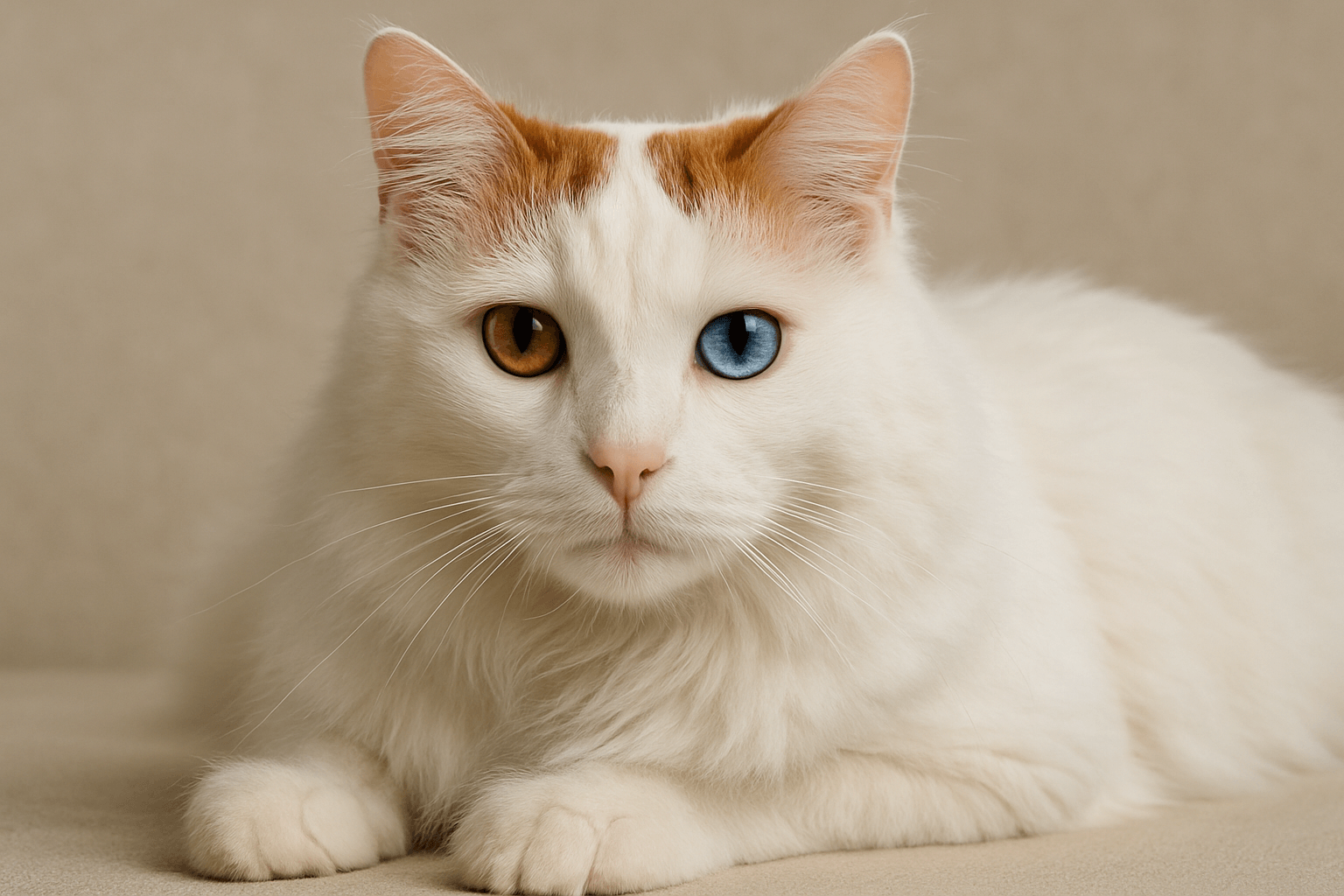Turkish Van Cat Lifespan: How to Help Your Feline Friend Thrive for Decades
The Turkish Van is more than just a cat—it’s a living painting, a splash of marble-white fur with intelligent, expressive eyes and a spirit as wild as the lakes of its ancestral homeland. Known for their love of water, playful intelligence, and loyal companionship, these cats often become the heart of the home. But how long can you expect to share your life with one? The Turkish Van cat lifespan is typically 12 to 17 years—and with the right care, many live well beyond 18. Understanding what drives their longevity isn’t just about numbers; it’s about honoring their unique biology, temperament, and needs.
Why the Turkish Van Lives Longer Than Most Breeds
Turkish Vans aren’t just beautiful—they’re remarkably resilient. Their natural vigor and low predisposition to genetic disorders contribute to an impressive lifespan. Here’s what makes them so enduring:
Robust Genetic Heritage:
Bred in the wilds of eastern Turkey with minimal human interference, Turkish Vans retain strong, diverse genes that resist inherited diseases common in heavily inbred breeds.Active Lifestyle Instincts:
Their natural athleticism and love of climbing, swimming, and exploring keep their muscles, joints, and hearts in peak condition.Low Susceptibility to Breeding-Related Illnesses:
Unlike flat-faced breeds, Turkish Vans have no brachycephalic traits, meaning fewer respiratory or eye issues.Strong Immune System:
Their evolutionary adaptation to harsh climates has honed a natural resistance to common feline pathogens.Emotional Resilience:
Turkish Vans form deep bonds but are not overly dependent. This emotional balance reduces stress-related illnesses.
When you bring a Turkish Van into your home, you’re not just adopting a pet—you’re inviting a survivor into your life. Their longevity is a gift, but it requires you to meet them halfway.

Key Factors That Extend a Turkish Van Cat’s Lifespan
A Turkish Van’s potential for a long, vibrant life doesn’t happen by accident. It’s shaped daily by your choices. Here’s how you can maximize their years:
High-Quality, Protein-Rich Diet:
As obligate carnivores, they thrive on meat-based nutrition. Avoid fillers like corn, soy, or artificial additives that strain their organs.Consistent Hydration:
Turkish Vans love water—encourage it with fountains, wet food, and fresh bowls. Proper hydration prevents kidney disease, the #1 killer of senior cats.Regular Veterinary Checkups:
Annual exams (biannual after age 10) catch early signs of hyperthyroidism, heart issues, or dental decay before they become critical.Mental and Physical Stimulation:
Puzzle feeders, climbing towers, and interactive play sessions prevent boredom-induced stress and obesity.Safe Indoor Environment:
Keeping your Van indoors protects them from traffic, predators, toxins, and infectious diseases—dramatically increasing life expectancy.
A Turkish Van doesn’t just live longer with care—it lives better. Every meal, every game, every vet visit is a thread in the tapestry of their longevity.
Check this guide 👉Maine Coon Turkish Angora Mix: Best 7 Expert Tips!
Check this guide 👉Turkish Angora Tuxedo Cat: Best 7 Expert Tips!
Check this guide 👉Turkish Angora Cat Size: Best 7 Expert Tips!
| Lifespan Influencers | Impact on Health & Longevity |
|---|---|
| Diet Quality (High Animal Protein, Low Carbs) | Reduces diabetes risk, supports muscle mass, and maintains healthy weight. |
| Indoor Living Environment | Eliminates exposure to cars, fights, parasites, and infectious diseases. |
| Access to Fresh Water and Wet Food | Prevents urinary tract disease and chronic kidney disease—leading causes of death. |
| Regular Dental Care | Prevents periodontal disease, which can lead to heart and kidney damage. |
| Daily Play and Mental Engagement | Reduces stress, prevents obesity, and keeps cognitive function sharp into old age. |
Common Health Issues That Can Shorten a Turkish Van’s Life
Despite their hardiness, Turkish Vans aren’t immune to illness. Knowing the risks lets you act early.
Heart Conditions (HCM):
Hypertrophic Cardiomyopathy is the most serious threat. Regular echocardiograms after age 5 are critical for early detection.Dental Disease:
Plaque buildup leads to gum inflammation, tooth loss, and systemic infection. Brush teeth weekly and schedule professional cleanings.Obesity:
Turkish Vans are muscular and active, but overfeeding or lack of exercise can lead to diabetes, arthritis, and liver disease.Kidney Disease:
Especially common in older cats. Signs include increased thirst, weight loss, and poor coat condition. Early intervention slows progression.Ear Infections:
Their semi-long fur can trap moisture. Check ears monthly for odor, redness, or discharge—common in humid climates.
Don’t wait for symptoms. Prevention is your most powerful tool. A simple blood panel at your vet’s office can detect kidney or thyroid issues before your cat shows any outward signs.
The Role of Environment in Turkish Van Longevity
Turkish Vans don’t just need food and vet visits—they need a home that speaks to their soul. Their environment shapes their stress levels, activity, and ultimately, their lifespan.
Vertical Space is Non-Negotiable:
They are natural climbers. Cat trees, wall shelves, and window perches satisfy their need to survey territory and stretch.Water Access Must Be Irresistible:
Many Turkish Vans prefer running water. Invest in a ceramic fountain—they’ll drink more, hydrate better, and avoid urinary issues.Quiet, Stable Routines:
These cats bond deeply and dislike sudden changes. Keep feeding, play, and sleep times consistent to reduce anxiety.Safe Outdoor Access (If Any):
If you allow outdoor time, use a secure catio. Turkish Vans are curious, athletic, and may wander far—putting them at risk.Companionship Without Overstimulation:
They crave human connection but dislike being held tightly. Let them choose when to be near you—they’ll reward you with loyalty.
A Turkish Van thrives not just in a house, but in a sanctuary designed for their instincts. Give them space, water, and respect—and they’ll give you decades of devotion.
Signs Your Turkish Van Is Aging Gracefully (or Struggling)
Recognizing the difference between normal aging and illness is crucial. Here’s what to watch for as your Van enters their golden years:
Coat Changes:
A slightly duller coat is normal. But patchy hair loss, greasiness, or mats suggest poor grooming due to arthritis or illness.Mobility Shifts:
Slower jumps or reluctance to climb? Could be arthritis. Sudden stiffness or limping? See your vet immediately.Appetite or Thirst Changes:
Increased thirst + weight loss = possible kidney disease or hyperthyroidism. Decreased appetite for more than 24 hours is an emergency.Sleep Patterns:
Older cats sleep more—but if they seem confused, disoriented, or forget where their litter box is, cognitive decline may be setting in.Vocalization Changes:
Excessive meowing, especially at night, can signal pain, hearing loss, or anxiety.
Aging isn’t decline—it’s transition. Your job is to adapt your care to meet their changing needs, not to ignore the signs.
Nutrition: The Foundation of a Long Turkish Van Life
What you feed your Turkish Van directly determines how long and how well they live. This isn’t opinion—it’s physiology.
Avoid Grain-Based Kibble:
Cats lack enzymes to digest carbs. High-carb diets lead to obesity, diabetes, and inflammation.Prioritize Animal Proteins:
Look for “chicken,” “turkey,” or “fish” as the first three ingredients—not “meat by-products” or “poultry meal.”Feed Wet Food as the Base:
At least 70% of their diet should be wet food to ensure hydration and reduce kidney strain.Supplement with Taurine and Omega-3s:
These support heart and brain health. Many premium brands include them, but check labels.Portion Control is Key:
Even healthy cats gain weight easily. Use a scale to measure food and adjust for activity level.
A Turkish Van fed a species-appropriate diet often outlives peers by 3–5 years. Nutrition isn’t a cost—it’s an investment in time.
How to Keep Your Turkish Van Mentally Sharp Into Old Age
Cognitive decline is real in senior cats. But unlike humans, cats can’t tell you they’re confused. You must be their protector.
Interactive Toys Daily:
Puzzle feeders, treat-dispensing balls, and wand toys stimulate problem-solving and prevent boredom.Rotate Toys Weekly:
Newness keeps their curiosity alive. Store some away and reintroduce them later for “new” excitement.Teach New Tricks:
Turkish Vans are intelligent. Teaching them to sit, high-five, or fetch builds mental resilience.Introduce Novel Scents:
Cat-safe herbs like catnip or silvervine provide sensory enrichment and mental stimulation.Maintain Familiar Routines:
Sudden changes in layout, schedule, or household members can trigger anxiety and cognitive stress.
A sharp mind is as vital as a strong heart. Mental engagement isn’t a luxury—it’s a longevity necessity.
FAQ: Turkish Van Cat Lifespan
How long do Turkish Van cats typically live?
Most live 12 to 17 years. With excellent care, many reach 18–20 years or older.
Are Turkish Vans prone to genetic diseases?
Compared to purebred cats with limited gene pools, they’re surprisingly healthy. The main concern is HCM (heart disease), so screen after age 5.
Do Turkish Vans need special food?
Not “special” brands—but they need high-protein, low-carb, moisture-rich food. Wet food should dominate their diet.
Can Turkish Vans live outdoors?
Technically yes, but it’s risky. Their curiosity and lack of fear make them vulnerable to traffic, predators, and disease. Indoor living extends lifespan dramatically.
Why does my Turkish Van love water?
It’s a breed trait. They evolved near Lake Van in Turkey, where they learned to swim for fish. It’s instinct, not a quirk.
Live Fully, Love Deeply—Your Turkish Van Will Remember It
A Turkish Van doesn’t just live beside you—they choose you. They leap onto your lap when you’re tired, splash in their fountain like it’s a lake, and follow you from room to room like a silent, elegant shadow. Their lifespan isn’t measured in years, but in moments: the purr at dawn, the head-butt after a long day, the way they curl up beside you when the world feels heavy.
You gave them safety.
You gave them water they love.
You gave them space to climb, play, and be wild—even in your home.
Canned Pumpkin for Cat Diarrhea: Best 7 Expert Tips! Natural remedy to firm stools, soothe upset bellies, and support gut health safely.
Can a Cat Give You Scabies? Best 7 Expert Tips! Discover the truth about feline mites, human skin risks, and how to protect yourself—without panic.
Cat Flea vs Human Flea: Best 7 Expert Tips! Discover the truth about bites, species, and how to eliminate infestations for good.
Weird Cat Behaviors: Best 7 Expert Tips! Discover why cats do strange things—and how to understand, not punish, their instincts for a happier home.





